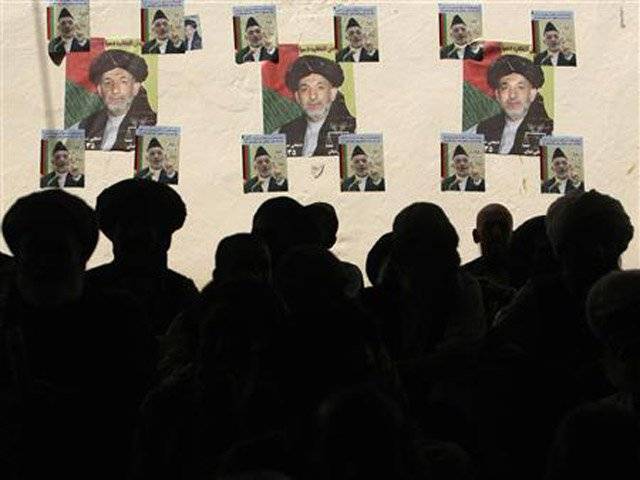Hamid Karzai and his main rival Abdullah Abdullah entered the last day of campaigning for the Afghan presidency on Monday with the outcome hanging on the threat of violence and the clout of old militia chiefs. A former Uzbek militia leader, General Abdul Rashid Dostum, jetted back to the country overnight from exile in Turkey, perhaps to deliver enough support among his followers to swing the election for Karzai in a single round. Polls have shown Karzai firmly in the lead with about 45 percent of the vote, but not by enough to win an outright majority and avoid a run-off against Abdullah, a former foreign minister with strong support in the north of the country. The prospect of violence could hurt Karzai's first-round chances. Taliban militants have vowed to disrupt the poll, which could hurt turn-out, especially in the Pashtun south of the country, which overwhelmingly supported Karzai in the past. The Taliban claimed responsibility for a suicide car bomb on Saturday outside the headquarters of international troops in the center of Kabul, which killed seven Afghans and wounded scores. Most Taliban threats against the election itself have been vague -- threatening reprisals, but not making clear whether they will target infrastructure, polling stations or voters. Abdullah, whose campaign has built surprisingly strong momentum on the strength of popular rallies, was due to address followers in Kabul and the southern province of Paktia on the last official day of campaigning before Thursday's poll. Karzai has secured the endorsements of ethnic chieftains and former militia bosses, but that tactic has raised the alarm of Western donors fearful of a return to power by warlords whose factional fighting in the 1990s tore the country apart. Few of the former militia chiefs are viewed with more suspicion by the West than Dostum, a whisky-drinking ex-Communist general whose militia repeatedly changed sides during the civil war. Dostum won 10 percent of the vote during the last election in 2004, and his support could tip the balance for Karzai. He arrived in Kabul late on Sunday shortly after the government announced that he was free to return. It had never been made clear whether his exile was forced or self-imposed. The United Nations and the United States both expressed concern at the prospect that Dostum could return to a position in government in exchange for delivering votes to Karzai. "The special representative has said in the past that to drive this country forward it needs more competent politicians and fewer warlords," said Aleem Siddique, spokesman for the U.N. mission in Kabul. A U.S. official said Washington had made its "serious concerns" about a future role for Dostum clear to the Afghan government and said Dostum's reputation "raised questions of his culpability for massive human rights violations". Karzai also boosted his chances last week by securing the last-minute endorsement of Ismail Khan, a regional potentate with strong influence in the western city of Herat. His two vice presidential running mates are former guerrilla chiefs from the Tajik and Hazara minorities, and he has also secured support of ex-guerrillas from his own Pashtun group. Despite those endorsements, Karzai has faced a surprisingly strong challenge from Abdullah, an urbane former Foreign Minister who has his own roots in a mainly ethnic-Tajik guerrilla faction but has sought to broaden his appeal beyond that base. Polls show Abdullah with about 25 percent of the vote, enough to make him the near-certain challenger in a run-off in October should Karzai fail to win in the first round. The election is a test for U.S. President Barack Obama's strategy of escalating the eight-year-old war in an effort to turn the tide after years of Taliban advances. More than 30,000 extra U.S. troops have arrived in Afghanistan this year, raising the number of Western troops above 100,000 for the first time, including more than 62,000 Americans. U.S. and British troops have launched major offensives, taking unprecedented casualties -- more Western troops have died in Afghanistan since March than in the entire period from 2001-2004. A bomb killed three more British soldiers on Sunday. Western troops are expected to take a low profile for the election itself, leaving security inside towns and villages to Afghanistan's own security forces.
Friday, April 19, 2024
Last hours of campaign, Karzai seeks warlord edge

8:27 AM | April 19, 2024
8:09 AM | April 19, 2024
Polling begins in first phase of India’s marathon general elections
3:31 PM | April 19, 2024
UNICEF to provide $20m for youth projects in Pakistan
2:04 PM | April 19, 2024
Maryam reviews progress on Nawaz Sharif IT City project in Lahore
2:04 PM | April 19, 2024
Pakistan, Saudi Arabia vow to solidify efforts in defence collaboration
1:38 PM | April 19, 2024
Minister reviews naan, roti prices
April 19, 2024
A Tense Neighbourhood
April 19, 2024
Dubai Underwater
April 19, 2024
X Debate Continues
April 19, 2024
Hepatitis Challenge
April 18, 2024
IMF Predictions
April 18, 2024
Kite tragedy
April 19, 2024
Discipline dilemma
April 19, 2024
Urgent plea
April 19, 2024
Justice denied
April 18, 2024
AI dilemmas unveiled
April 18, 2024
ePaper - Nawaiwaqt
Advertisement
Nawaiwaqt Group | Copyright © 2024





